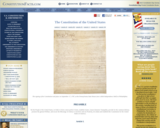
Read the United States Constitution
- Subject:
- History
- Social Science
- Social Studies
- Material Type:
- Reading
- Provider:
- ConstitutionFacts.com
- Date Added:
- 01/03/2023

Read the United States Constitution
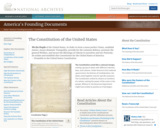
The Constitution acted like a colossal merger, uniting a group of states with different interests, laws, and cultures. Under Americaâ"s first national government, the Articles of Confederation, the states acted together only for specific purposes. The Constitution united its citizens as members of a whole, vesting the power of the union in the people. Without it, the American Experiment might have ended as quickly as it had begun.

The Constitution was written in the summer of 1787 in Philadelphia, Pennsylvania, by delegates from 12 states, in order to replace the Articles of Confederation with a new form of government. It created a federal system with a national government composed of 3 separated powers, and included both reserved and concurrent powers of states. The president of the Constitutional Convention, the body that framed the new government, was George Washington, though James Madison is known as the "Father of the Constitution" because of his great contributions to the formation of the new government. Gouverneur Morris wrote the Constitutionâ"s final language. The Constitution was a compact – though Federalists and Anti-Federalists disagreed over whether the states or the people were the agents of the compact.
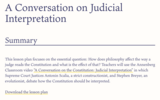
This lesson plan focuses on the essential question: How does philosophy affect the way a judge reads the Constitution and what is the effect of that? Teachers will use the Annenberg Classroom video âA Conversation on the Constitution: Judicial Interpretationâ in which Supreme Court Justices Antonin Scalia, a strict constructionist, and Stephen Breyer, an evolutionist, debate how the Constitution should be interpreted.

The Declaration of Independence asserts that ‘all men are created equal’ and are endowed with certain unalienable rights - ‘life, liberty and the pursuit of happiness’. When those words were written, over 52 percent of Williamsburg’s population was enslaved. This is a special release of Created Equal,” a museum theatre exploration of African American perspectives on the Declaration, the revolutions it inspired, and the ongoing struggle for equality and freedom in America. It first premiered live on stage at Colonial Williamsburg on July 4th, 2019.

Since 2005, the "Past and Present" podcast from Colonial Williamsburg has taken you behind the scenes to meet interpreters, chefs, tradesmen, musicians, historians, curators, and more. We offer two versions of our podcast: one that's audio-only and one that includes a slideshow. In this episode: Hear the Declaration of Independence read in its entirety by renowned Thomas Jefferson interpreter Bill Barker.
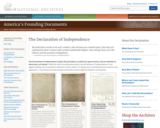
The Declaration of Independence states the principles on which our government, and our identity as Americans, are based. This source provides a transcript of the document, pictures of the original, and links to additional sources to help understand The Declaration as a whole.
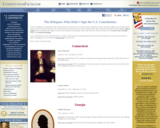
In all, 70 delegates were appointed to the Constitutional Convention, but out of that 70 only 55 attended, and only 39 actually signed. Some simply refused, others got sick, still others left early.
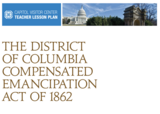
The D.C. Compensated Emancipation Act was an important and symbolic victory. It was part of a larger struggle over the meaning and practice of freedom and citizenship. What does it mean to be a participating member of society? What does freedom and citizenship mean?

The purpose of this lesson is to assist student understanding of the expressed and implied powers of the president. By the conclusion of this lesson, students will understand the scope and purpose of these powers and be able to describe how they play out in real life. Students will also understand the importance of constitutional checks on presidential powers--examining the ways that a president could abuse his or her power should constitutional checks not exist. Students will also understand the informal ways the public contributes to the president’s role.

The students will examine, explain, and evaluate Article II, Section 1 of the US Constitution for specific information concerning the eligibility requirements and election process for the office of President of the United States and develop a position and express a viewpoint on the lesson’s "essential question": "How democratic is the American election process for the office of president?"

Students will examine aspects of Article II of the Constitution for specific information related to the requirements for and method of electing the president.
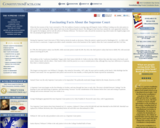
A list of fascinating facts about the Supremem Court of the United States of America
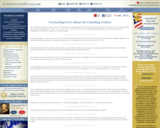
A list of fascinating facts about the United States Constitution
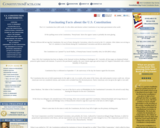
A list of fascinating facts about the United States Constitution

This lesson addresses two essential questions: To what extent does the Bill of Rights provide a "blanket of protection" for American citizens? Why do many Americans believe that the Bill of Rights is especially relevant today?

Discover the work of Cornelia Adèle Fassett, one of the first female portrait artists of the 19th century to portray American presidents, politicians, and Supreme Court Justices.

Take the Founding Fathers quiz to find out how much you know about the Founding Fathers of the United States of America.

Since 2005, the "Past and Present" podcast from Colonial Williamsburg has taken you behind the scenes to meet interpreters, chefs, tradesmen, musicians, historians, curators, and more. We offer two versions of our podcast: one that's audio-only and one that includes a slideshow. In this episode, Paul Aron, Director of Publications for Colonial Williamsburg, joins to discuss his new book Founding Feuds: The Rivalries, Clashes, and Conflicts that Forged a Nation.” In this podcast, Paul delves into some of the most infamous feuds of the 18th and 19th centuries that included some very famous names such as Thomas Jefferson, James Madison, and Alexander Hamilton.

This lesson will use close reading of documentary selections and class discussion to analyze the concepts of “freedom” and “equality” as they have appeared and been tested throughout American history. By the conclusion of this lesson, students should be able to view these ideas as contested concepts that can and often do exist in tension. Students will assess whether or not “equality” comes at the expense of “freedom” and vice versa.